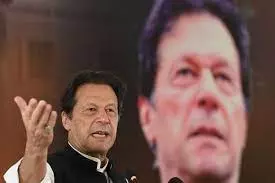Islamabad October 15 2022: Pakistan’s former premier Imran Khan faces a crucial popularity test as he contests in seven of the eight by-elections on Sunday, looking to build momentum for his campaign to pressure the six-month-old government into calling an early national vote.
The seats fell vacant after all 131 lawmakers from Khan’s Pakistan Tehreek-e-Insaf party resigned from parliament’s lower house in April after he was ousted from power through a no-confidence vote. Elections to those seats are being held in phases.
If he does win all the seats as he expects, the former leader will have to resign from all but one, and elections for those will have to happen again. However, Khan — a flamboyant former cricket star — sees the vote as another show of his mass appeal after his party won a majority of 20 seats in a similar by-election in July in the most populous province of Punjab.
He has also taken to the streets, rallying his supporters to massive public gatherings and locking horns with the new government and the military that’s ruled the country for about half its history. His demands include early general elections, which Prime Minister Shehbaz Sharif’s government has refused. Pakistan must announce a national ballot by August next year when the five-year term of the current parliament ends.
“These elections are very important for Khan’s PTI as well as the ruling coalition,” said Mazhar Abbas, a Karachi-based political analyst. “A victory would mean that people are buying Khan’s narrative, not only on their TV screens but also electorally.”
A defeat would mean “an equally big political setback” for Khan “and the narrative he is trying to build,” he said.
The political drama comes as Sharif’s government grapples with economic distress. Moody’s downgraded the nation’s credit rating and Pakistan’s foreign exchange reserves have dipped to the lowest levels in three years. Devastating floods earlier this year have also added to the crisis. In August, it secured a $1.1 billion loan from the International Monetary Fund, but funds from the World Bank and Asian Development Bank are still awaited.
On Wednesday, Khan said he had wielded little to no decision-making powers during his three-and-half-year tenure, despite having won the electoral mandate. While he didn’t name anyone, he appeared to be alluding to being manipulated by the army.
There was no immediate comment from the army.
Khan’s clash with the powerful generals has been a sharp turnaround for a politician, who according to his detractors, won power in August 2018 because of the army’s backing.
The by-elections, earlier slated for Sept. 25, were delayed because of the floods. Three seats each in central Punjab and in northwest Khyber Pakhtunkhwa provinces and two in southern Sindh province are up for grabs. Early results are expected to trickle in on Sunday evening.
While a sweeping win will embolden Khan and his supporters, his current spate of legal woes may put a brake on his political ambitions.
The Election Commission has said his party received illegal foreign funds from the US, Australia and the United Arab Emirates. The PTI party has denied the charge and is appealing the order.
Any decision on what punishment the party faces if it loses its appeal rests with the Supreme Court. It could face a ban on contesting elections.
Pakistan’s top investigative agency has also filed a complaint against Khan for receiving funds illegally in his party’s accounts from the now-defunct Dubai-based Abraaj Group founder Arif Naqvi, the Dawn newspaper has reported. Khan has had to get preemptive bail in two of the cases.
A criminal conviction could see Khan being barred from running for office for five years, according to Pakistani law.










